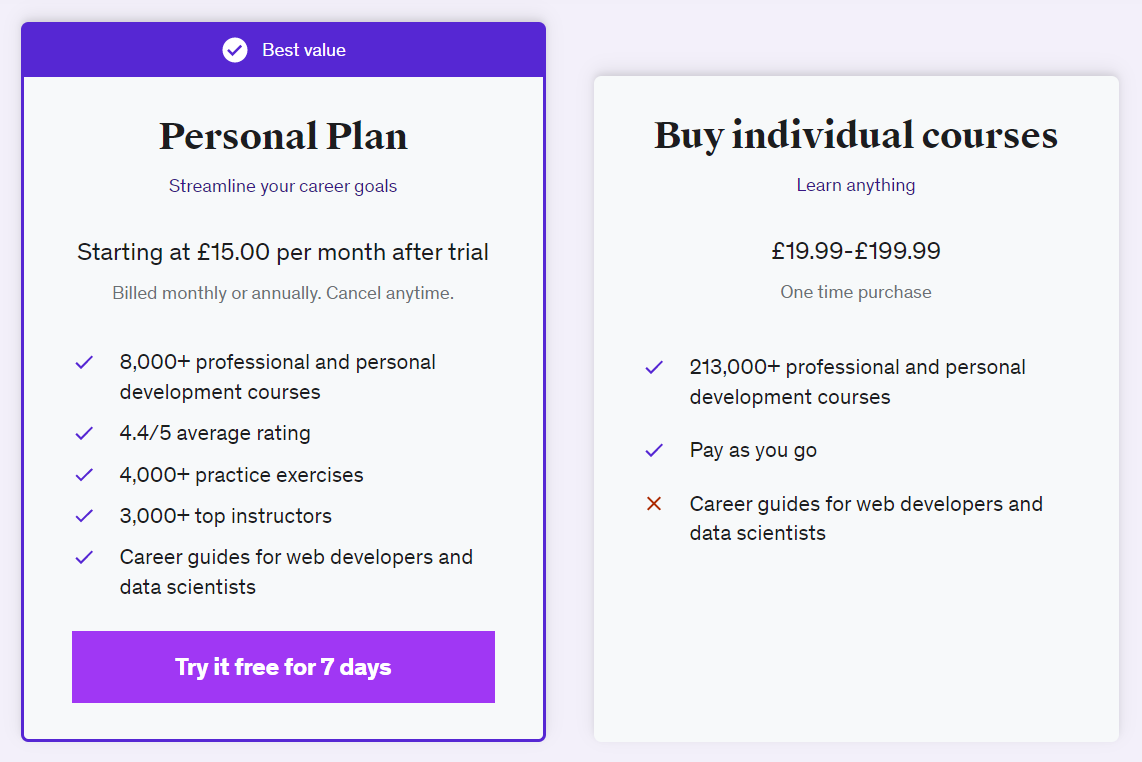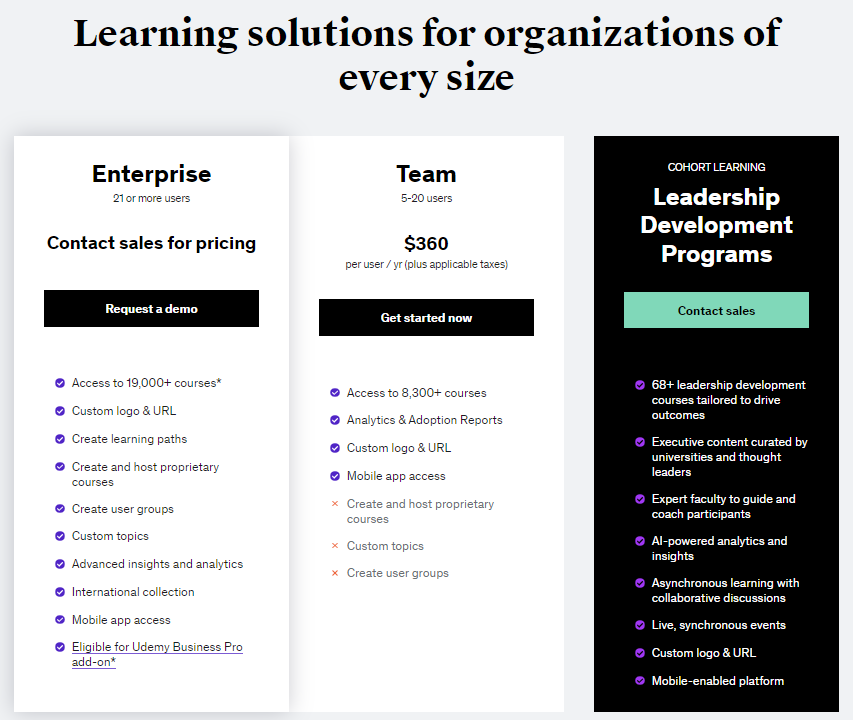AFFILIATE MARKETING
How The Online Platform Makes Money in 2023

Are you looking for a way to sharpen your skills and gain new knowledge? Udemy is an online learning platform with courses in almost every conceivable topic, from software development and personal finance to yoga and crochet. And the sustainability of the Udemy business model continues to drive innovation in how we learn, allowing students and instructors to connect and build expertise that can lead to career growth or lifelong learning.
In this blog post, we’ll explore what makes Udemy so successful and the range of benefits offered by its unique structure.
Overview of Udemy’s Business Model – How Does Udemy Work?
Udemy’s business model seems almost too good to be true; an online marketplace where people can access thousands of paid courses on a huge range of topics taught by the world’s best instructors – all at prices that won’t break the bank.
This inexpensive source of learning has become increasingly popular amongst students over the years, and it certainly sounds tempting. But how does the Udemy business and revenue model work?
Methods of Revenue for Udemy
It’s quite simple: Udemy allows everyone to sell their knowledge and skills in exchange for Udemy’s commission (plus any net revenue from each course sold). Once a course is published, buyers can purchase it, with payment taken via credit card, PayPal, or other reliable payment methods.
With more than 213,000+ courses on offer and over 57 million users across the globe, Udemy is becoming one of the leading online education providers.
The Udemy platform makes money through various revenue models, including tuition revenues from selling courses, paid acquisition, and Udemy for Business.
- Course sales involve a 50/50 split between the instructor and Udemy on any sale made.
- The paid acquisition piece of the Udemy revenue model involves buying advertising slots on other platforms, such as Google or Facebook, and charging instructors a 75 percent fee for each course sale.
- Udemy also offers a personal subscription plan for individuals, giving access to thousands of courses.
- Udemy for Business involves two subscription plans for companies, with pricing depending on the size of the team. These plans offer additional features such as custom categories and user groups, tracking user activity, and Slack integration.
All of these methods of revenue enable Udemy to expand its customer base and diversify its offerings while generating higher revenues.
Individual Course Purchases
Purchasing an individual course on Udemy involves creating an account and selecting the desired course. Once payment has been received, students have direct access to the content within their own personal dashboard.
Udemy Subscriptions
Udemy also offers a Personal Plan on an annual or monthly subscription service basis for individuals. This gives professional adults access to thousands of online courses they can take at their own pace, covering various topics such as IT and web development, soft skills, business, marketing & design.

Udemy Business offers a premium subscription for companies and teams that unlocks additional benefits for Udemy business customers with unlimited access to courses, personalized recommendations, learner engagement stats, and employee training plans.
This additional feature allows Udemy to earn annual or monthly subscription revenue from users.
How Much Money Does Udemy Make?
According to Crunchbase, the Udemy business ecosystem reported $90 million in 2018 and $140 million in 2019. This shows steady growth over the years.
Additionally, Udemy has seen tremendous success in its funding endeavors, raising an accumulative $311.4 million from 16 rounds of investment! On October 29th, 2021, Udemy made its debut on the NASDAQ stock exchange under the ticker UDMY with an initial public offering of $29.00 per share.
Udemy’s total income for the third quarter of 2022 increased an impressive 22%, totaling $158.4 million! In addition, Udemy Business saw its revenue grow by a staggering 67% year-over-year and achieved Annual Recurring Revenue (ARR) of $350 million – demonstrating that it is well on its way to becoming a leader in online education and learning solutions.
Who is Udemy For?
Udemy is for anyone who wants to learn new skills and gain knowledge in various subjects. Udemy courses are created by instructors from all backgrounds and cover dozens of topics, such as programming, personal development, business, marketing, and more.
Through the Udemy marketplace, users can find short courses that will help them quickly develop the skills they need for their careers or hobbies.
The Udemy online platform is also great for organizations and businesses looking to provide employees with educational opportunities, as the Enterprise plan offers a centralized hub of learning materials.
Finally, Udemy is an excellent platform for those who want to become instructors themselves and share their knowledge with others.
Take a look at our article on how to make money on Udemy.
Udemy For Companies
Udemy Business provides learning solutions for organizations of every size, with access to 19,000+ courses covering a wide range of topics.
With leadership development programs and international course collections available, the platform provides insights and analytics to help businesses track user engagement.
Finally, customers can access 24/7 customer support with a dedicated customer success partner.

Udemy For Individuals
Udemy offers over 19,000 courses in various topics, such as Business Fundamentals, Entrepreneurship, Digital Marketing, Development, and Personal Development.
This learning platform also provides tailored recommendations for students to find the perfect course to suit their needs and interests.
With the Personal Plan, users can access 8,000 of Udemy’s top-rated courses at discounted prices with exclusive longtime-learner deals.
Udemy For Course Creators
Udemy offers the opportunity to share your knowledge with learners worldwide and gives you the support you need to become a successful teacher.
With their user-friendly instructor dashboard, creating courses is simpler than ever! Instructors are provided detailed guides that offer step-by-step instructions for making classes – as well as a helpful Instructor Support Team available 24/7 if clarification or feedback on test videos is required.
Udemy provides everything needed for teachers to deliver remarkable online learning experiences! Check out our article looking into how much Udemy instructors make.
Why Is Udemy Such a Bargain?
The Udemy marketplace business model means courses are affordable for several reasons.
- First and foremost, they are created by individuals without the support of a larger organization or institution, which reduces the cost associated with producing a course.
- Secondly, automated assessment tools such as quizzes help to eliminate manual grading costs.
- Udemy often puts courses on sale to generate sales and create a sense of urgency and scarcity. This encourages potential students to take advantage of the discounted prices before they expire.
- In addition, Udemy’s subscription plans allow businesses and organizations to purchase access to thousands of courses at reduced rates.
These strategies enable Udemy to offer customers high-quality courses without breaking the bank. It is no wonder that Udemy has become one of the leading online learning platforms in the world.
Udemy Business Model – Conclusion
Udemy is an online learning platform that allows instructors to create, share, and sell their courses to a huge audience.
It takes a 50 percent cut when users buy a course directly through the Udemy website and a 75 percent cut when they purchase it via paid acquisition channels like Google Ads or Facebook Ads.
Furthermore, Udemy offers a personal subscription plan for individuals as well as plans for teams called Udemy Business.
Udemy courses are relatively cheap due to the automated grading system and creating a perception of value and scarcity effects.
Additionally, Udemy has amassed an enormous total of $311.4M in investment capital over 16 distinct funding rounds, skyrocketing its potential to new heights. Udemy continues to expand into new markets and spend on product development.
Overall, Udemy provides a valuable e-learning platform for instructors to put their courses out there and make money while also allowing students to access an abundance of knowledge at affordable prices.
With the rise of online learning platforms offering more convenient options for education, Udemy is likely to remain a leading player in the space.
AFFILIATE MARKETING
AI Will Transform the Workplace. Here’s How HR Can Prepare for It.

Opinions expressed by Entrepreneur contributors are their own.
Our workplaces are about to undergo an unprecedented level of transformation, and HR will take center stage. Artificial intelligence will dramatically reshape HR in a way that goes beyond recruiting, hiring and talent management. Leadership teams at all levels need to embrace this change to transform and lead their organizations forward.
It’s the people, and not the technology, that makes AI initiatives a success. Intrapreneurs, in particular, are the driving force behind it. As I shared in Fearless Innovation, I noticed this when I was working on the innovation agenda for the Great Places to Work study — the most innovative companies were those that had a leadership team that was embracing intrapreneurship and were open to change.
HR is the beating heart of any organization, and as such, it needs to take center stage in both adopting and leading ethical and innovative AI transformation across the organization.
Related: How Artificial Intelligence Is Reinventing Human Resources
4 tectonic shifts AI will drive in HR
1. A new wave of massive reskilling
As AI becomes more prominent across business functions, the need for new skills will only grow. Forty percent of enterprise leaders believe that their workforce would need to reskill as a result of AI and machine learning. In fact, research shows almost a third of all hours worked in the U.S. could be automated by 2030.
All of us need to reskill to some extent to be relevant in the AI era. Not only would people need to re-train, but generative AI is introducing a whole host of professions that have been non-existent until recently, from AI ethicists to human-AI interaction designers. Some of these roles might sound futuristic, yet they are becoming increasingly relevant as technology advances.
2. The great restructure
As automation takes center stage across more business functions, there will be the inevitable need for organizations to restructure and rethink how they work. This transition will not only involve the integration of new technologies but also introduce a shift in the workforce dynamics. Intrapreneurs will need to identify gaps both in skills and operational processes and forge brand-new roles for themselves and those they manage. HR must play a key role in enabling a smooth and easy transition in this regard. The transition will not be smooth or easy, and it’s only HR that has the capability to make it impactful.
3. Arrival of “digital humans”
“Digital human” may sound like an oxymoron, but that’s the term that’s starting to appear in business and operational plans. More roles, regardless of industry, are becoming digitally enhanced where some form of AI assistance is embedded in their everyday work. A real-life example is the introduction of the digital nurse — AI-powered healthcare agents which have already been proven to outperform human nurses in certain tasks.
Imagine the impact these digital roles will have on the workforce the more sophisticated and prevalent they become. Eventually, HR will need to create policies and systems in place that account for this new type of “staff augmentation.”
4. Regulating the robot
The threat of AI bias and misuse is serious. Not only can the technology put many jobs at peril, but potential improper implementation can expose organizations to serious liability and negatively affect the workforce. From avoiding bias to inclusivity, HR teams play a critical role in the ethical deployment and management of AI technologies.
HR professionals will be tasked with navigating the delicate balance between leveraging AI for efficiency and ensuring that its application upholds fairness, privacy and non-discrimination.
What HR intrapreneurs must do to embrace AI the right way
The future of work is being shaped by AI adoption, and its success hinges on the right approach from the outset. My experience shows that for successful organizations, one universal trait stands out: the presence of change agents. Every organization, regardless of size, benefits from intrapreneurs who are open to change and committed to spearheading transformation efforts. These intrapreneurs are pivotal in driving the future of work, as they help orchestrate the integration of new technologies into their business models.
HR and talent leaders should harness this dynamic, encouraging a symbiotic relationship with intrapreneurs to develop customized solutions for AI adoption, ensuring that they are not just keeping pace with technological advances but are actively shaping their trajectory.
Securing a seat at the table:
HR should take a proactive stance in the adoption of AI, even if it is still in its early stages within your organization. By securing a position at the forefront of the AI initiative, HR can and should facilitate and guide the entire organization in embracing this significant change.
As AI has the potential to impact every facet of the organization, it is imperative for HR to not only understand and advocate for this technology but also lead its integration across all departments. HR should encourage and support intrapreneurs and all employees to leverage AI in their daily tasks, demonstrating its value not just for operational efficiency but for personal and professional growth as well.
Master the technology:
To effectively navigate and regulate AI, HR must first understand it thoroughly. Grasping the full potential of this technology is crucial for reaping its extensive benefits. HR plays a vital role in identifying the necessary tools and skills that employees must acquire and then integrating these learnings into daily work practices.
Before implementing AI more broadly, HR should initiate comprehensive training programs that not only educate but also reassure employees about AI’s role in the future of the business. By leading these educational initiatives, HR can shape the structure and effectiveness of these programs, ensuring they meet the needs of the organization and its workforce.
Related: 3 Ways to Prepare Your Business For an AI Future
Looking ahead
Generative AI has the transformative potential to redefine the business landscape, but realizing this vast potential hinges on more than just the adoption of technology. It critically depends on the talent within the workforce, driven by HR and bold intrapreneurs. These visionary leaders don’t just implement new tools; they exemplify their use, demonstrating the profound impact of AI across every level of the organization.
HR plays a pivotal role in fostering this environment, enabling intrapreneurs to guide and inspire every individual they touch. Together, they turn each employee into a catalyst for change, igniting a widespread passion for innovation that deeply resonates and sustains long-term success.
AFFILIATE MARKETING
Samsung: 6-Day Workweek For Execs, Company in Emergency Mode

Four-day workweeks might have all the buzz, but one major tech company is going in the opposite direction.
Samsung is implementing a six-day workweek for all executives after some of the firm’s core businesses delivered lower-than-expected financial results last year.
A Samsung Group executive told a Korean news outlet that “considering that performance of our major units, including Samsung Electronics Co., fell short of expectations in 2023, we are introducing the six-day work week for executives to inject a sense of crisis and make all-out efforts to overcome this crisis.”
Lower performance combined with other economic uncertainties like high borrowing costs have pushed the South Korean company to enter “emergency mode,” per The Korea Economic Daily.
Related: Apple Is No Longer the Top Phonemaker in the World as AI Pressure and Competition Intensifies
Executives at all Samsung Group divisions will be affected, including those in sales and manufacturing, according to the report.
Samsung had its worst financial year in over a decade in 2023, with the Wall Street Journal reporting that net profit fell 73% in Q4. It also lost its top spot on the global smartphone market to Apple in the same quarter, though it reclaimed it this year.
Though employees below the executive level aren’t yet mandated to clock in on weekends, some might follow the unwritten example of their bosses. After all, The Korea Economic Daily reports that executives across some Samsung divisions have been voluntarily working six days a week since January, before the company decided to implement the six-day workweek policy.
Entrepreneur has reached out to Samsung’s U.S. newsroom to ask if this news includes executives situated globally, including in the U.S., or if it only affects employees in Korea. Samsung did not immediately respond.
Research on the relationship between hours worked and output shows that working more does not necessarily increase productivity.
A Stanford project, for example, found that overwork leads to decreased total output. Average productivity decreases due to stress, sleep deprivation, and other factors “to the extent that the additional hours [worked] provide no benefit (and, in fact, are detrimental),” the study said.
Related: Samsung’s Newest Galaxy Gadget Aims ‘To See How Productive You Can Be’
Longer hours can also mean long-term health effects. The World Health Organization found that working more than 55 hours a week decreases life expectancy and increases the risk of stroke by 35%.
The same 55-hour workweek leads to a 17% higher risk of heart disease, per the same study.
AFFILIATE MARKETING
John Deere Hiring CTO ‘Chief Tractor Officer,’ TikTok Creator

This article originally appeared on Business Insider.
Agriculture equipment company John Deere is on the hunt for a different kind of CTO.
The brand on Tuesday announced a two-week search to find a “Chief Tractor Officer” who would create social media content to reach younger consumers.
One winning applicant will receive up to $192,300 to traverse the country over the next several months showcasing the way John Deere products are used by workers, from Yellowstone National Park to Chicago’s Wrigley Field and beyond.
“No matter what you do — whether it’s your coffee, getting dressed in the morning, driving to work, the building you go into — it’s all been touched by a construction worker, a farmer, or a lawn care maintenance group,” Jen Hartmann, John Deere’s global director of strategic public relations, told AdAge.
To kick off the search, John Deere tapped NFL quarterback Brock Purdy (who will presumably be a bit busy this Fall to take the job himself) to star in a clip in which he attempts to set out on a road trip in an industrial tractor.
Suited up in the obligatory vest, work boots, and John Deere hat, Purdy’s progress is interrupted by teammate Colton McKivitz hopping into the cab while a string of messages floods in from other athletes and influencers expressing interest in the job.
The clip also represents the first time that the 187-year-old company has used celebrities to promote itself, Hartmann told AdAge.
According to the contest rules, entrants have until April 29 at midnight to submit a single 60-second video making their pitch for why they should be the face and voice of the company.
In addition, entrants must live in the 48 contiguous states or DC — sorry Hawaii and Alaska residents. Interestingly, any AI-generated submissions are prohibited, too.
Videos will be judged against four categories — originally, creativity, quality, and brand knowledge — after which five finalists will be chosen and notified after May 17.
-

 SEARCHENGINES6 days ago
SEARCHENGINES6 days agoGoogle Core Update Volatility, Helpful Content Update Gone, Dangerous Google Search Results & Google Ads Confusion
-

 SEO6 days ago
SEO6 days ago10 Paid Search & PPC Planning Best Practices
-

 MARKETING7 days ago
MARKETING7 days ago2 Ways to Take Back the Power in Your Business: Part 2
-

 MARKETING5 days ago
MARKETING5 days ago5 Psychological Tactics to Write Better Emails
-

 SEARCHENGINES5 days ago
SEARCHENGINES5 days agoWeekend Google Core Ranking Volatility
-

 PPC7 days ago
PPC7 days agoCritical Display Error in Brand Safety Metrics On Twitter/X Corrected
-

 MARKETING6 days ago
MARKETING6 days agoThe power of program management in martech
-

 SEO5 days ago
SEO5 days agoWordPress Releases A Performance Plugin For “Near-Instant Load Times”














You must be logged in to post a comment Login